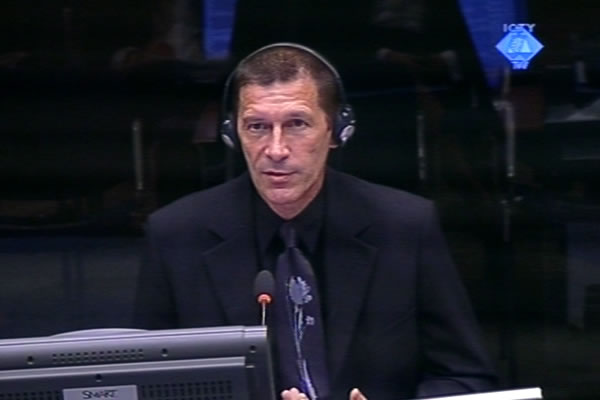Home
PEOPLE DIED FOR NO REASON IN BRISEVO
Ivo Atlija, a Bosnian Croat from Prijedor, is testifying at the trial of Ratko Mladic on the attack of Serb forces on the village of Brisevo and neighboring villages. In the summer of 1992 about 200 persons were killed there. 'It's a shame so many people died for no reason', said the witness. Atlija's father was killed in Brisevo
 Ivo Atlija, witness at the Ratko Mladic trial
Ivo Atlija, witness at the Ratko Mladic trial ‘It’s a shame so many people died for no reason’, Ivo Atlija said at the trial of the former VRS Main Staff commander Ratko Mladic. In the summer of 1992, Serb forces killed about 200 persons in Brisevo and neighboring villages, the witness claimed. Many men were taken to prison camps, while women and girls were raped.
On 25 May 1992, the residents of Brisevo surrendered all their weapons to the local Serb authorities, yet on 24 July, the village was shelled using heavy artillery. ‘Regular troops and Chetniks’ killed 68 persons in the attack. The witness later learned that soldiers of the 6th Krajina Brigade and 5th Kozara Brigade participated in the attack.
In the written statement Atlija gave to the OTP investigators in 2000, he recounted that women in the area had been raped, but didn’t want to divulge their names. As the witness explained today, the victims have all been raised and live in a ‘conservative Catholic environment’. The disclosure of their identities would additionally humiliate them and cause mental suffering. The witness’s statement was admitted into evidence together with a video recording showing the remains of the village church. The church was one of many churches the Serb troops destroyed that summer in the area.
As the witness said, ‘to date’ nobody has been held responsible for the murder, rape and other crimes against the villagers of Brisevo and surrounding villages. Atlija said that he had discussed crimes several times with Vojo Kupresanin, who was a high-ranking official in the Serbian Democratic Party. Kupresanin made empty promises, saying he would intervene and speak with General Talic, the 1st Krajina Corps commander. Atlija also met with Milomir Stakic, who was the mayor of Prijedor, and other local officials, asking them to allow the remaining people to leave the area and thus prevent more deaths and suffering, but his efforts were in vain.
As the officials told Atlija, they were already facing accusations of ethnic cleansing: if they allowed those people to leave Prijedor, it would be another argument against the Serb side. ‘I got the impression that they needed us as hostages as they haggled in the political negotiations that were going on at the time’, the witness said. After the war nobody returned to the village of Brisevo. Only three or four houses have been rebuilt so that those who come once a year to commemorate the suffering of their kin have a place to stay.
In the first part of the cross-examination, Mladic’s defense counsel Branko Lukic focused on the witness’s claim in his statement that the media called for the revenge against Croats and Muslims. Lukic asked the witness if the Serbs in Prijedor really believed that they were in danger from ‘fundamentalists’ and ‘Ustasha’. The witness, as he said, still finds it ‘the saddest thing, that they really did think so’.
Lukic will continue his cross-examination of Ivo Atlija tomorrow.
Linked Reports
- Case : Mladic
- 2012-09-04 SEFIK HURKO’S SECOND ENCOUNTER WITH RATKO MLADIC
- 2012-09-04 VRHPOLJE BRIDGE MASSACRE
- 2012-09-03 WITNESS OF MASSACRE IN ROOM 3 IN KERATERM PRISON CAMP
- 2012-09-06 PICKAXES, SHOVELS, BLOOD AND TEARS
- 2012-09-06 WITNESS ACCUSES ARMY, DEFENSE BLAMES PARAMILITARIES
- 2012-09-19 'KARADZIC'S GUESTS' IN OMARSKA AND TRNOPOLJE
